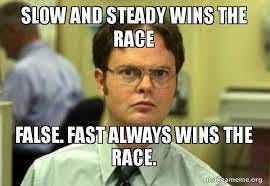Doing Fast & Slow
Set your time, actions, and goals.
If you haven’t read the book “Thinking, Fast & Slow” yet, I highly recommend it. It explores the two systems of thought that drive the way we think and make decisions: System 1, which is intuitive and automatic, and System 2, which is more deliberate and rational. It explains how these systems work and how they can lead to cognitive biases that affect our judgment and decision-making.
During a discussion with a couple of entrepreneurs this week, I realized that they were always at one extreme of the spectrum, either too tolerant with the pace of execution of their team or, on the contrary, way too demanding towards them.
Let’s start with the evil side. I find it very disturbing when leaders and managers put insane pressure on their teams, when boundaries of respect are crossed, when the overall environment is getting toxic instead of fairly demanding. Of course, that sense of urgency is pushing everyone to deliver as fast as they can, with as few mistakes as one can expect. But it also destroys people.
One summer I met with a few executives of Uber who had all left the company within the past six months. They had launched and run some of the largest initiatives of the company in many countries. I remember someone telling me before meeting with them: They are identified as the “Lost Boys” because, after that experience, nothing can really compare to what they have gone through in terms of means, ambition, tension, pressure, everything... Despite their apparent success, they are burnt. Well, believe me, or not, they all had that same look and feel on their face, tired, lost, and burnt. I felt bad for them.
This being said I find it very annoying when founders fail at setting a pace of execution that match the ambition and expectations they had envisioned when they got started. I just don’t get why you would let the people who are working in your company deliver subpar efforts and performances. The lack of accountability lies within how leaders and managers demonstrate the highest work ethic, and also how the attributes of time, actions, and goals are set within the company.
I like to say that we must be impatient in action, yet patient with the results. The sense of urgency doesn’t necessarily mean that everything can be done and achieved in record time. However, it’s ridiculous to think that low expectations lead to astonishing results. And it’s delusional to believe that you can achieve more while finding the perfect work-life balance. Even that notion is a fallacy. There is no such thing as a perfect work-life balance. Your mission is to find the right equilibrium. Sometimes you’re super busy, and sometimes you’re not. Sometimes you manage to get everything done, some other times not.
Work-life balance is a rope that gets tensed and loose, sometimes a bit too much in one way or another, and we try never to break it nor to let it drag on the floor.
We must constantly be fast and slow, in our thinking but also our doing, and find a way to be intentional about it. If you don’t want to set certain expectations or fuel your sense of achievement, that’s fine. I mean it’s on you, but maybe try at least to find your Ikigai.
And again, being intentional starts also by being more concrete. Time, Actions, and Goals. Those three attributes are tied together to most of the things that we do.
Good luck with finding that balance :)

